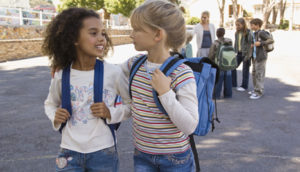Parents are often worried about the corrupting effects of bad companions on their kids. When you find your son’s best friend spitting sassy retorts at his mom when she tries to correct him or your daughter’s girlfriends expanding their vocabularies with words that are not SAT approved. You just want to separate them from these contagious behaviours.
Though parents try not to micro-manage their children’s relationships and their ability to develop healthy friendships, bad influences are often of great concern. Oftentimes, parents tend to struggle through separating their children from such relationships.
In this segment, Katherine Lee helps parents with 7 Tips for Separating Your Child from a Bad Friend
Don’t forbid your child from seeing his friend. If you simply tell your child that you don’t want him to play with his friend anymore, and even worse, if you don’t explain why your child is likely to be confused and upset. Asking him to suddenly give up something that is important to him–in this case, a good friend–will only make your child feel like you don’t care about his opinions or thoughts and will likely make him want to see his friend even more.
Ask your child to tell you about their friendship. Approach the topic in a non-confrontational way by simply asking your child to list the things she likes about her friend. (You may want to set an example by talking about your good friends and what you like about them.) Once you get your child talking about her friend’s positive traits, ask her if she noticed anything about her friend that wasn’t nice or kind, or even worried or upset her.

Explain what a good friendship looks like. Tell your child that friends are supposed to help you through tough times and celebrate victories, not make you insecure or be jealous of your success. By helping her understand what a healthy and loving friendship looks like, she may see that her own friendship with this child isn’t as great as she thought.
Give your child specific examples of what you are concerned about. Have his grades gone down? Are his teachers noticing that he is not paying attention in school? Have you seen a change in his mood or behaviour at home? Talk to your child about these specific changes, whether it’s talking back, using more curse words, being more defiant, or being anxious or insecure about himself, and explain that you’re worried about the influence his friend may have had on these changes.
Initiate the slow fade. Cut back your child’s time with the friend gradually, so that your child and her friend don’t have an abrupt break. (The exception to this would be if your child is being hit or yelled at by this friend, or if the friend has shown that she is very clingy and possessive of your child, and may become angry or upset by a gradual withdrawal; if you’re worried that the friend may harm your child, make a clean and quick break.) Schedule some time with other friends for your child, and do more activities together as a family. Go on a picnic, take a day hike, or drive somewhere for a fun weekend away. Keeping your child busy and occupied will help ease the transition away from her friend.
Be firm but supportive. If your child asks if he can see his friend again, remind him about the unpleasant or upsetting things that may have happened that made it necessary to take a break from this friendship. Allow your child to talk about what he misses about his friend but be firm about why you believe this is the best thing for now. Chances are, your child may also have had some doubts about his friend, and later on, with time and distance, your child may thank you for stepping in.
Talk with your child’s teacher. She may be able to help you by separating your child and her friend at school and by keeping an eye on the friend’s behaviour to make sure your child isn’t affected by any negative emotions or actions.
Of course, if your child’s friend is not a bad influence or toxic, you may want to just let nature take its course and see how the friendship evolves. While some friendships can last a lifetime, the fact is that many bonds with peers, especially among school-age kids, is not permanent and may change. A friend who is your child’s best buddy this year maybe someone he only sees occasionally in the next year or grows into someone he doesn’t hang with at all as they get older.
Don’t forget, taking action to separate your child from the “wrong crowd” should be based on facts or, at least, circumstantial evidence.




